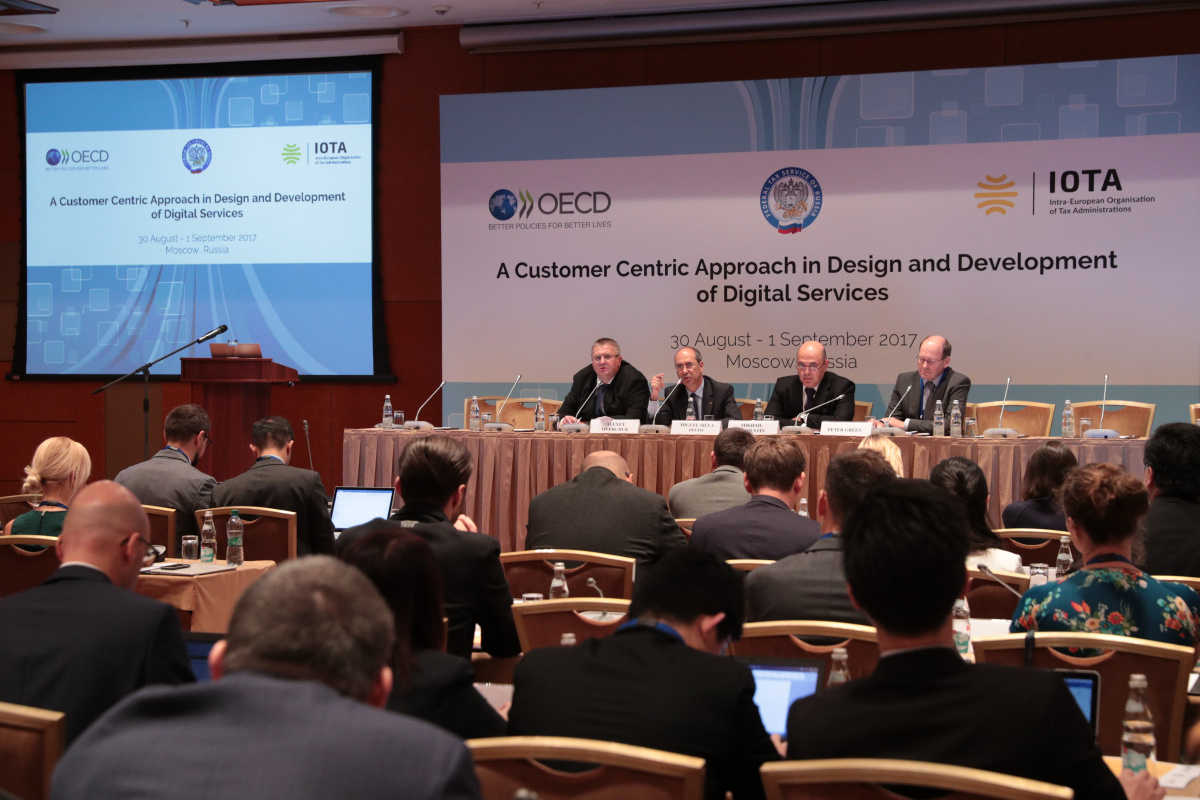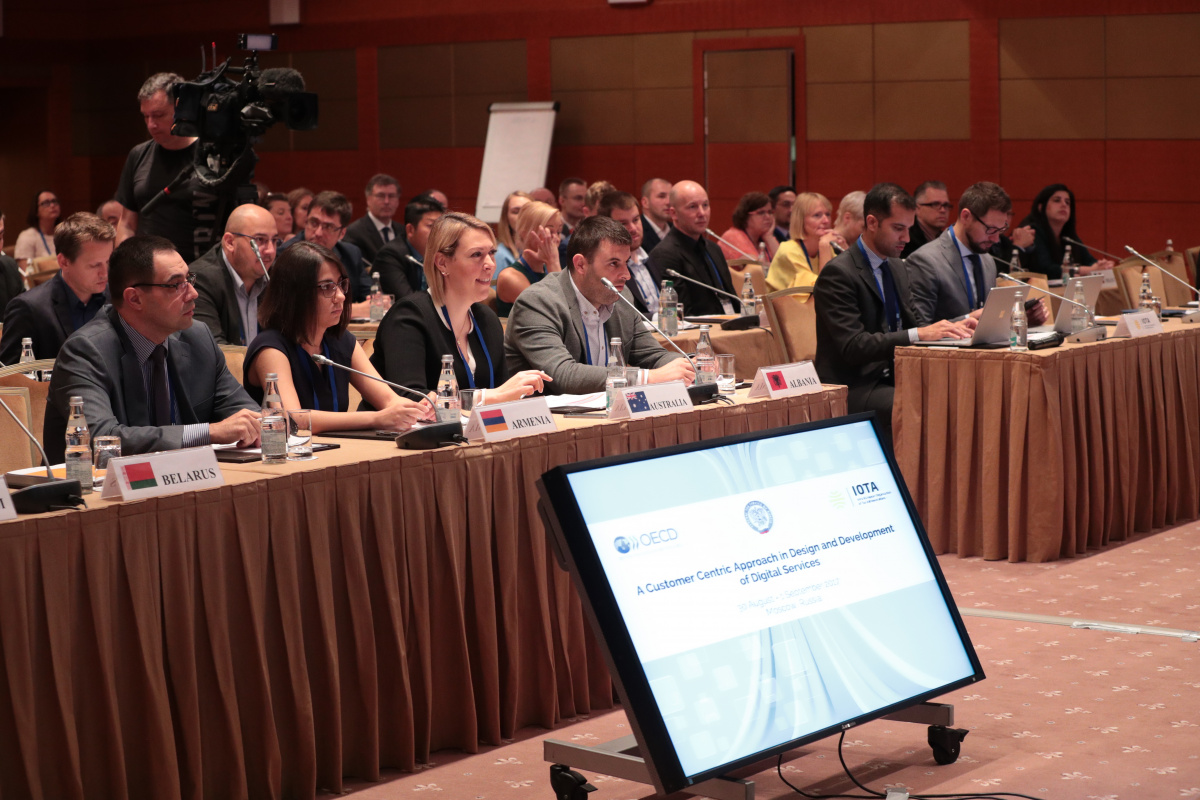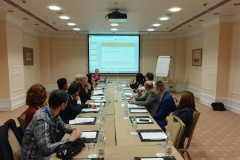The joint IOTA-OECD workshop on ’A Customer Centric Approach in Design and Development of Digital Services’ took place from 30 August until 1 September 2017 in Moscow, Russia. Supported by the Federal Tax Service of Russia, the event attracted more than 80 participants from tax administrations of Europe as well as from Australia, Canada, Chile, China, India, Israel, Malaysia and Singapore who together with the business representatives from Russia and the UK discussed the ways of customer engagement in rethinking of tax administration's service delivery, and also exchanged experiences about the development of mobile solutions.
 The workshop was opened by Mr Miguel Silva Pinto, Executive Secretary of IOTA welcoming the delegates and underlining the importance of joined efforts demonstrated by IOTA and OECD providing the opportunities for tax administrations from around the world to explore the new trends and approaches to user experience design, particularly with regard to the responsive design of websites and mobile applications. Mr Pinto was followed by Mr Peter Green, Head of OECD FTA Secretariat, reflecting on the OECD work in the area of taxpayer services, especially the success of the E-Services and Digital Delivery project led by Russia. The introduction ended with a keynote speech from Mr Mikhail Mishustin, Commissioner of Federal Tax Service, highlighting the opportunities offered by newly developed digital solutions (e.g. online cash registers, automatic VAT control system, RFID goods tagging system, etc.) to better manage tax risks and to improve taxpayer compliance in Russia.
The workshop was opened by Mr Miguel Silva Pinto, Executive Secretary of IOTA welcoming the delegates and underlining the importance of joined efforts demonstrated by IOTA and OECD providing the opportunities for tax administrations from around the world to explore the new trends and approaches to user experience design, particularly with regard to the responsive design of websites and mobile applications. Mr Pinto was followed by Mr Peter Green, Head of OECD FTA Secretariat, reflecting on the OECD work in the area of taxpayer services, especially the success of the E-Services and Digital Delivery project led by Russia. The introduction ended with a keynote speech from Mr Mikhail Mishustin, Commissioner of Federal Tax Service, highlighting the opportunities offered by newly developed digital solutions (e.g. online cash registers, automatic VAT control system, RFID goods tagging system, etc.) to better manage tax risks and to improve taxpayer compliance in Russia.
 During the 2.5-day event the existing practices of customer centric design and co-creation, including some of the specific methods and techniques (i.e. sprints, usability tests/studies, engagement platforms, collaboration centres, etc.) were presented by delegates from Australia, Denmark and Finland. A range of approaches towards taxpayer-centred digital services were demonstrated by experts from Canada, Singapore and Sweden. Also, a speaker from Norway shared some valuable learning points from the ongoing digital transformation in the public sector which requires a continuous delivery and integration of the operations in a tax administration.
During the 2.5-day event the existing practices of customer centric design and co-creation, including some of the specific methods and techniques (i.e. sprints, usability tests/studies, engagement platforms, collaboration centres, etc.) were presented by delegates from Australia, Denmark and Finland. A range of approaches towards taxpayer-centred digital services were demonstrated by experts from Canada, Singapore and Sweden. Also, a speaker from Norway shared some valuable learning points from the ongoing digital transformation in the public sector which requires a continuous delivery and integration of the operations in a tax administration.
The main points of discussion in the breakout sessions were mobile service delivery platform, information security and measuring the success and efficiency of mobile solutions, thus allowing the delegates to share their experiences, discuss problems and come up with solutions on these topics.
 The other advantage of the workshop was participation of the representatives from business community and IT companies presenting their views and experience of developing mobile apps and other digital solutions to create a multi-optional and value-based customer journey. Additionally, delegates debated about the ways for tax administrations to work together/partner with software developers and tax intermediaries to deliver a digital experience and/or integrate tax seamlessly into their natural systems.
The other advantage of the workshop was participation of the representatives from business community and IT companies presenting their views and experience of developing mobile apps and other digital solutions to create a multi-optional and value-based customer journey. Additionally, delegates debated about the ways for tax administrations to work together/partner with software developers and tax intermediaries to deliver a digital experience and/or integrate tax seamlessly into their natural systems.
Further information about the workshop, including all presentations, is available here for registered users.
